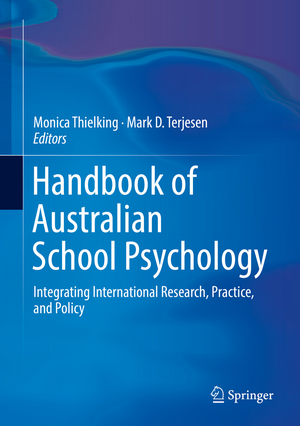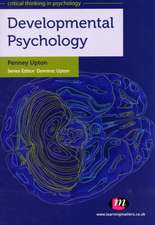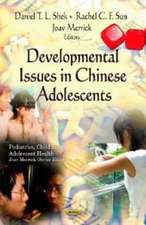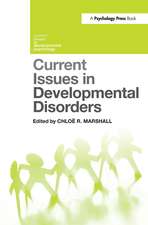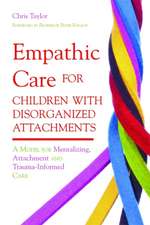Handbook of Australian School Psychology: Integrating International Research, Practice, and Policy
Editat de Monica Thielking, Mark D. Terjesenen Limba Engleză Hardback – 9 feb 2017
This handbook addresses the current state and practice of school psychology with a focus on standards unique to Australia, including historical, legal, ethical, practical, and training factors. It provides a compilation of the most current research-based practices as well as guidelines for evidence-based assessment and intervention for common conditions (e.g., autism, depression, learning disabilities) and for delivering appropriate services to targeted student populations (e.g., LGBT, gifted, medical issues). Chapters discuss the application of national and international school psychology practices within the Australian educational and psychological structure. The handbook also examines the lack of formal resources specific to Australia’s culture and psychology systems, with its unique mix of metropolitan cities and the vast geographic landscape that spans regional and remote areas. It offers numerous case studies and innovative school mental health programs as well as recommendations for professional development and advocacy that are unique to Australian school psychology.
Topics featured in this Handbook include:
- Evidence-based assessment and intervention for dyscalculia and mathematical disabilities.
- Identification and management of adolescent risk-taking behaviors and addictions.
- Understanding and responding to crisis and trauma in the school setting.
- Prevention and intervention for bullying in schools.
- Class and school-wide approaches to addressing behavioral and academic needs.
- The role of school psychologists in the digital age.
- Practical advice for school psychologists facing complex ethical dilemmas.
The Handbook of Australian School Psychology is a must-have resource for researchers, scientist-practitioners, and graduate students in child and school psychology, social work, and related fields that address mental health services for children and adolescents.
Preț: 3600.05 lei
Preț vechi: 4390.30 lei
-18% Nou
Puncte Express: 5400
Preț estimativ în valută:
688.85€ • 719.23$ • 570.13£
688.85€ • 719.23$ • 570.13£
Carte tipărită la comandă
Livrare economică 04-18 aprilie
Preluare comenzi: 021 569.72.76
Specificații
ISBN-13: 9783319451640
ISBN-10: 3319451642
Pagini: 792
Ilustrații: LVI, 799 p. 840 illus., 829 illus. in color.
Dimensiuni: 178 x 254 x 44 mm
Greutate: 17.27 kg
Ediția:1st ed. 2017
Editura: Springer International Publishing
Colecția Springer
Locul publicării:Cham, Switzerland
ISBN-10: 3319451642
Pagini: 792
Ilustrații: LVI, 799 p. 840 illus., 829 illus. in color.
Dimensiuni: 178 x 254 x 44 mm
Greutate: 17.27 kg
Ediția:1st ed. 2017
Editura: Springer International Publishing
Colecția Springer
Locul publicării:Cham, Switzerland
Cuprins
Chapter 1. National and International Perspective on School Psychology: Research, Practice, and Policy.- Chapter 2. A History of School Psychology in Australia.- Chapter 3. School Psychology in Remote Australia.- Chapter 4. Child and Adolescent Development.- Chapter 5. The Culturally Competent School Psychologist.- Chapter 6. Resources for Ethical School Psychological Practice in Australia.- Chapter 7. Promoting Success of School Psychology: Collaborating with Others.- Chapter 8. Evidence-Based Identification of Specific Learning Disability in Schools.- Chapter 9. Evidence-Based Assessment and Intervention for Problems with Reading.- Chapter 10. Evidence-Based Assessment and Intervention for Dyscalculia and Maths Disabilities.- Chapter 11. Evidence-Based Assessment and Intervention for Problems with Writing.- Chapter 12. Student Mental Health and Psychological Interventions in a School Setting.- Chapter 13. Evidence-Based Assessment and Intervention for Depression in School Psychology.- Chapter 14. Evidence-Based Assessment and Intervention for Anxiety in School Psychology.- Chapter 15. Identification and Prevention of Suicidality: The Role of the School Psychologist.- Chapter 16. Evidence-Based Assessment and Intervention for ADHD in School Psychology.- Chapter 17. Evidence-Based Assessment and Intervention for ODD and CD.- Chapter 18. Evidence-Based Assessment and Intervention for Anger in School Psychology.- Chapter 19. Evidence-Based Assessment and Intervention for Autism in School Psychology.- Chapter 20. Evidence-Based Assessment and Intervention for Students with an Eating Disorder.- Chapter 21. Understanding and Responding to Crisis and Trauma in the School Setting.- Chapter 22. Understanding and Responding to Adolescent Risk Taking Behaviors and Addictions.- Chapter 23. Systems-Change in Schools: Class and School-Wide Approaches to Addressing Behavioral and Academic Needs.- Chapter 24. Group-Based Approaches to School Psychology.- Chapter 25. Social and Emotional Learning: Role of Psychologists in Australia.- Chapter 26. Prevention and Intervention for Bullying in Schools.- Chapter 27. Evidence-Based Parenting Programs: Integrating Science into School-Based Practice.- Chapter 28. School Psychological Practice With Students From Socioeconomically Disadvantaged Backgrounds.- Chapter 29. Gifted Youth in Schools.- Chapter 30. School Psychology with Gay, Lesbian, Bisexual, Transgender, Intersex, and Questioning (QLBTIQ) Youth.- Chapter 31. School Psychological Practice with Deaf and Hard of Hearing Students.- Chapter 32. School Psychological Practice with Students with Sleep Problems.- Chapter 33. Best Practices for School Psychologists in Assessing and Assisting Vision Impaired Students.- Chapter 34. School Psychology and Students with Medical Issues.- Chapter 35. Measuring Outcomes in Schools.- Chapter 36. Integrating Positive Psychology and Gratitude to Work in the Schools.- Chapter 37. School Psychologists in the Digital Age.- Chapter 38. Promotion of Leadership and Advocacy in School Psychology.- Chapter 39. Provision of Supervision and School Psychologists' Self-Care.- Chapter 40. Future Directions in School Psychology in Australia.
Notă biografică
Dr Monica Thielking worked for over ten years in Melbourne secondary schools as a youth worker, careers counsellor and school psychologist. In 2006, after completing her Professional Doctorate in Counselling Psychology focusing on the role of school psychologists, she accepted the position as the Australian Psychological Society’s National Advisor to Psychologists in Schools where she provided professional guidance, led advocacy campaigns, developed landmark resources, Chaired the APS National School Psychology Reference Group, and founded and convened the APS Psychologists in Schools Interest Group. Dr Thielking’s appointment at Swinburne University of Technology in 2010 facilitated her research and teaching on issues around school psychology, youth homelessness, student equity and ethical psychological practice. In 2015, Dr Thielking was appointed the Director of Postgraduate Studies in the Department of Psychological Sciences and convenes a unit on ethical and professional psychological practice. Dr Thielking’s work has had significant impact on government policy, service delivery and school psychology practice and she regularly presents at national and international conferences. Dr Thielking currently holds the position as Program Chair of the Division 52 (International Psychology) of the American Psychological Association. She is also a member of the Editorial Board for the Journal of Psychologists and Counsellors in Schools.
Dr Mark Terjesen is Associate Professor of Psychology at St. John’s University and program director of the School Psychology (PsyD and MS) programs. He earned his PhD in Clinical and School Psychology from Hofstra University. Dr Terjesen has presented at a number of national and international conferences on topics that include matters related to REBT, the assessment and treatment of ADHD, professional school psychology issues, as well as cultural concerns. Dr. Terjesen has trained many professionals internationally in school psychology and the use of cognitive behavioral practices with children and families. Dr Terjesen has served as President of the School Division of the New York State Psychological Association as the President of the Trainers of School Psychologists, the largest national training organisation for school psychology faculty members, and is a Past President of the Division 52 (International Psychology) of the American Psychological Association of which he is also a Fellow.
Textul de pe ultima copertă
This handbook addresses the current state and practice of school psychology with a focus on standards unique to Australia, including historical, legal, ethical, practical, and training factors. It provides a compilation of the most current research-based practices as well as guidelines for evidence-based assessment and intervention for common conditions (e.g., autism, depression, learning disabilities) and for delivering appropriate services to targeted student populations (e.g., LGBT, gifted, medical issues). Chapters discuss the application of national and international school psychology practices within the Australian educational and psychological structure. The handbook also examines the lack of formal resources specific to Australia’s culture and psychology systems, with its unique mix of metropolitan cities and the vast geographic landscape that spans regional and remote areas. It offers numerous case studies and innovative school mental health programs as well as recommendations for professional development and advocacy that are unique to Australian school psychology.
Topics featured in this Handbook include:
Topics featured in this Handbook include:
- Evidence-based assessment and intervention for dyscalculia and mathematical disabilities.
- Identification and management of adolescent risk-taking behaviors and addictions.
- Understanding and responding to crisis and trauma in the school setting.
- Prevention and intervention for bullying in schools.
- Class and school-wide approaches to addressing behavioral and academic needs.
- The role of school psychologists in the digital age.
- Practical advice for school psychologists facing complex ethical dilemmas.
Caracteristici
Synthesizes international school psychology issues and practices within the context of factors unique to Australia
Examines diverse education, training, job titles, and practices of school psychologists in Australia
Explores the demands on service delivery within mainstream metropolitan areas as well as across a vast geographic landscape
Discusses technology-based service delivery options for varied student populations?
Includes supplementary material: sn.pub/extras
Examines diverse education, training, job titles, and practices of school psychologists in Australia
Explores the demands on service delivery within mainstream metropolitan areas as well as across a vast geographic landscape
Discusses technology-based service delivery options for varied student populations?
Includes supplementary material: sn.pub/extras
